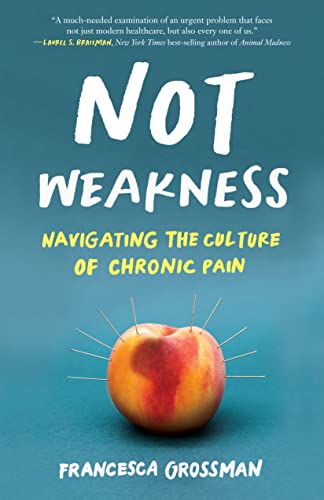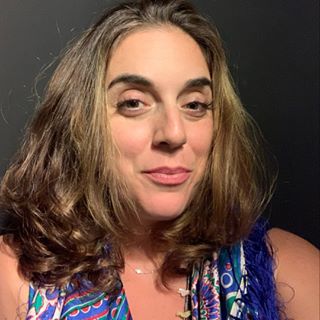I have been living in chronic pain for my whole adult life, and writing has always been the way I process, learn and understand what has happened and how I might think about it differently.
Francesca Grossman – 22 April 2023
The Back Flap
After thyroid cancer, Crohn’s disease, and a slew of other autoimmune conditions ransacked her body in her twenties and thirties, Francesca was left feeling completely alone in her chronic pain. Constant, relentless, often indescribable, and always exhausting, it affected her whole life—intimacy, motherhood, friendship, work, and mental health. Yet it was also fairly invisible—and because of that, Francesca felt entirely alone in the centrifuge of her own pain. But after twenty-plus years of living this way, isolated and depressed, she started to wonder: if she lived in pain, others must too—so why couldn’t she name one person in her community who suffered like she did?
On a whim, Francesca started asking women in her community if they had chronic pain—only to find that she was surrounded by women also battling in silence. The more she spoke to people, the more she found common themes and experiences, proving that her stories of pain were not unique, and neither were her feelings of loneliness and seclusion. Liberated by this discovery, Francesca realized something: while she couldn’t alleviate anyone’s pain, maybe she could lift the shadows surrounding it—bring these common stories into the light, with the goal of helping her fellow chronic pain sufferers feel a little less alone.
Imbued with a deep respect for the women who tell their stories in its pages, as well as a healthy skepticism of the healthcare world and how it can silence, shame, and ignore women in pain, Not Weakness is galvanizing memoir about living and loving with chronic pain.
About the book
What is the book about?
Part memoir, part journalism, Not Weakness shines a light on the silencing and shame women with chronic pain experience in our culture, showing readers in pain that they are not alone—even in a world in which they are rarely understood.
Francesca Grossman is no stranger to pain. In her 20s and 30s she endured thyroid cancer, Crohn’s disease, and other autoimmune conditions that left her feeling isolated in her suffering. Now Francesca shares her personal experiences and those of 20 other women with chronic pain in her new book, Not Weakness: Navigating the Culture of Chronic Pain (April 18th, 2023, She Writes Press), in which she challenges the toxic culture of shame, humiliation, and fear that surrounds pain, particularly in women.
When did you start writing the book?
I have been writing this book on and off for ten years. I started noticing that when I put my thoughts down on paper, I felt like my thoughts got more organized, and when I spoke to people, and recorded their thoughts and feelings, they felt unburdened too.
How long did it take you to write it?
I have been writing essays and articles on pain and its implications for years, but once I decided to make it into a book, it took about a year.
Where did you get the idea from?
I have been living in chronic pain for my whole adult life, and writing has always been the way I process, learn and understand what has happened and how I might think about it differently.
Were there any parts of the book where you struggled?
Writing is an interesting process – it is both easy and difficult at every step. Sometimes it flows right through me, and I look up and seven hours has gone by. And other times I write the same paragraph over and over without ever seeming to move forward.
What came easily?
I always have an easier time with the first draft. Sometimes it feels like throwing up (sorry!) – and my fingers can’t keep up with the pace at which words that want to rush out. So the first draft is always the fastest, and the revision is what takes the most time. I also did interviews for this book, and I wanted to be sure to accurately present the voices of women in pain I spoke to, so that took a lot of time as well.
Are your characters entirely fictitious or have you borrowed from real world people you know?
This is a memoir -creative non-fiction – so nothing is fictitious.
We all know how important it is for writers to read. Are there any particular authors that have influenced how you write and, if so, how have they influenced you?
So many! Cheryl Strayed, Samantha Irby, Jesmyn Ward, Sandra Cisneros, Joan Didion, James Baldwin, Samantha Dunn, Mary Karr, Maya Angelou, Steve Almond, Nancy Sommers, Ann Lamont, Steven King, Pam Houston, Ann Patchett…All of these writers (and so many more) write creative non-fiction in authentic and vulnerable ways. All of them make the personal universal, and use the prose to get to the inner heart of the human experience.
Do you have a target reader?
Anyone who lives in pain, or loves someone who lives in pain. (So, almost everyone)
About Writing
Do you have a writing process? If so can you please describe it?
I wish I had one I adhered to more consistently. I TRY to write in the morning, before I do any other work/email/life. I write for as long as I can, which is usually about 3-4 hours. I don’t revise when I write, I just let it all come out. Afternoons are for revision and a LOT of coffee. 2-3 hours. I have two kids, so after about 3pm, I don’t have the brain capacity for writing.
Do you outline? If so, do you do so extensively or just chapter headings and a couple of sentences?
For a book like this with lots of research and interviews I did outline. But often it takes me a draft before I know what I want to say and how. If I do outline, it is very basic. Chapter title, some bullets and questions I want to answer.
Do you edit as you go or wait until you’ve finished?
I always get one draft out before I will let myself revise. I find if I listen to anything else, I get distracted.
Do you listen to music while you write? If yes, what gets the fingers tapping?
I can only write in silence. It’s boring, but I get much more done.
About Publishing
Did you submit your work to Agents?
Yes, I have a wonderful agent – Jennifer Unter. She helps me at every stage.
What made you decide to go Indie, whether self-publishing or with an indie publisher? Was it a particular event or a gradual process?
I love She Writes Press – and Brooke Warner. It was the right fit for this book.
Any advice that you would like to give to other newbies considering becoming Indie authors?
Write the best book you can write. Don’t worry about what happens next. When it is really (REALLY) your best work, it will find the right home. Also – it’s hard to know what your best work is, especially because it’s a “writing life” not a “writing moment.” You get better with every word you put on paper – and going backwards is as important for learning as going forwards. So get help. Work with readers who are honest and provide feedback that is actually useful for improvement. Read their work too. Get very good at giving feedback that’s actually helpful. Don’t worry if you don’t agree with everything they say about the work, but try really hard to listen and absorb so that you can address confusion and make the work that much better. A lot of writers don’t believe in gate keepers. I do. Not because I think there are so many people who should stand in the way of a writer’s success, but because I feel those gate keepers can help us slow down, and only publish work that is ready. So many times I would have pushed something out into the world before it was my best effort had it not been for my agent, editor or reader who gave me feedback that helped take the work to the next level.
End of Interview:


